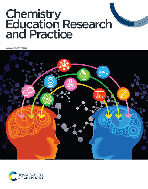Considering the hexad of learning domains in the laboratory to address the overlooked aspects of chemistry education and fragmentary approach to assessment of student learning
Abstract
This article seeks to provide researchers and practitioners in laboratory education, particularly those involved in the curriculum design and implementation of teaching laboratories at university level, with a conceptual framework and a working model for an integrated assessment of learning domains, by attending to a more holistic approach to learning in the laboratory. Prevailing learning theories suggest that the triad of cognitive, psychomotor, and affective domains should be addressed in order to warrant meaningful learning. In the research tradition of psychology and philosophy of mind, this triad also manifests as a concert of cognitive, conative, and affective domains. The paper argues that at least in the context of chemistry laboratory education, this is insufficient. The social and epistemic domains are often overlooked or dismissed altogether. Research in science studies may provide insight into the urgency and usefulness of integrating these domains into chemistry teaching and learning. Firstly, laboratory work is conceptualised here as an epistemic practice, in which students generate data, propose knowledge derived from the data, evaluate, and legitimise it. Secondly, the operationalisation of the hexad of learning domains is proposed, in terms of curriculum design, instruction, and assessment.


 Please wait while we load your content...
Please wait while we load your content...